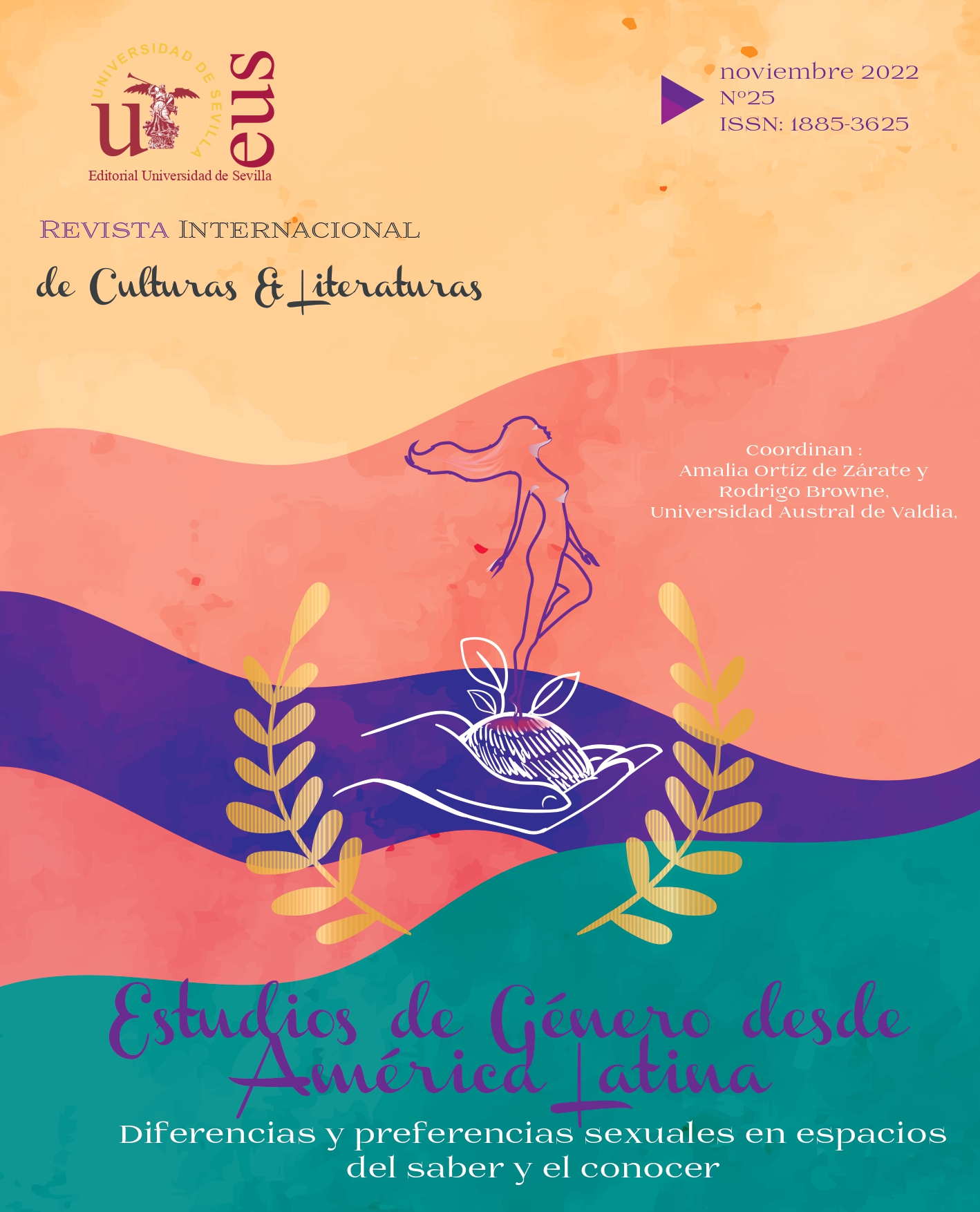Children's literature in latin america: Gender identity in the education
DOI:
https://doi.org/10.12795/RICL2022.i25.08Palabras clave:
gender identity, educational policies, literature, childhoodResumen
This essay explores the notion of gender identity as a dynamic process, modelled by socio-cultural relationships, in the context of education in Latin America. The historical construction of schooling in recent decades is discussed through some documents of UNESCO. As an example of gender inequality within educational proposals, some texts from children's literature will be analysed to highlight the gender stereotypes that still exist in the editorial industry today.
Descargas
Citas
Alcoff, Linda (1988). Cultural feminism versus post-structuralism: the identity crisis in feminist theory, Jornal of women in culture and society, Vol 13, n. 3. Chicago: Univerity Press, 405-436.
Alexander, Karl L. e Eckland, Bruce K. (1974). Sex Differences in the Educational attainment Process. American Sociological Review, N.5. October 1974, 668-682.
Alston, Philip (eds.) (1994). The best interests of the child. New York: Oxford University Press.
Armenise, Gabriella e De Leo, Daniela (2021). En-gender: l’immaginario della riscrittura di sé. In Morena Lago, Eva (ed.) (2021). Escrituras y escrotoras (im)pertinentes: narrativas y poéticas de la rebeldía (pp. 255-265). Madrid: Editorial Dykinson S. L.
Arnot, Madeleine e David, Miriam e Weiner, Gaby (1999). Closing the gender gap: postwar education and social change. Cambridge: Polity Press.
Arnot, Madeleine e Miles, Philip (2005). A reconstruction of the gender agenda: the contradictory gender dimensions in New Labour’s educational and economic policy. Oxford Review of education. Vol. 31, n.1 (March 2005), 173-189.
Barrett, Paul e Chavez, Daniele e Rodriguez-Garavito, Cèsar (2008). The New Latin American Left. London:Pluto Press.
Binati Martinez, Adriana (2009). A literatura hispano americana como processo formativo. In Anais do V Congresso Brasileiro de Hispanistas e I Congresso Internacional da Associação Brasileira de Hispanistas, dir. Sara Rojo et al. (pp. 71-80). Belo Horizonte: Faculdade de Letras da UFMG.
Bourdieu, Pierre e Passeron, Jean Claude (1971). La preproduction. Eléments pour une thèorie du système d’enseignement, Paris: Minut. Trad. Ital. (1972). La riproduzione: teoria del Sistema scolastico ovvero della conservazione dell’ordine culturale. Rimini: Guaraldi.
Campra, Rosalba (2006). America latina: l'identità e la maschera. Roma: Meltemi.
Candido, Antonio (1997). Formacao da literatura brasileira: momentos decisivos. 8 ed, v.1. Belo Horizonte/Rio de Janero: Itatiaia.
Carpentier, Alejo (1987). Um caminho de meio século. In Literatura do maravilhoso, v. 1. (143-162). San Paulo: Editora Revista dos Tribunais/Edicoes Vértice.
Collins, Randall (1971). Functional and Conflict Theories of Educational Stratification. American Sociological Review, vol. 36, n. 6 (dec 1971), 1002-1019.
Colombi, Beatriz (2004), Viaggio intellettuale. Migrazioni e spostamenti in America Latina (1880-1915). Rosario: Beatriz Viterbo Editora.
Complementing the online database on educational inequalities WIDE https://www.education-inequalities.org
Cornejo Polar, Antonio (2000). O condor voa: literatura e cultura latino americanas. Belo Horizonte: UFMG.
Daly, Mary (1978). Gyn Ecology. The Metaesthics of radical feminism. Boston: Beacon Press.
Davies, Susanna e Hossain, Naomi (1997). Livelihood Adaption, Public Action and Civil Society: A review of the Literature. IDS Working Paper 57. Brighton: IDS.
De Lauretis, Teresa (1999). Soggetti eccentrici, Milano: Feltrinelli.
Delors, Jacques (1997). Nell’educazione un Tesoro. Roma: Armando. Ed. or. (1996). Learning: the treasure within Report to Unesco of the International Commission on education for the Twenry-first Century. Paris: Unesco.
Faure, Edgar (1973). Rapporto sulle strategie dell’educazione (II edizione riveduta e ampliata). Roma: Armando. Ed or. (1972). Learning to be. Paris: Unesco.
Fernandez Aguerre (2004). Distribucion del conocimiento escolar: clases sociales, escuelas y sistema educativo en Latinoamerica, Città del Messico.
Fink, Nadia e Merchán, Cecilia (2016). Ni una menos desde los primeros años: Educación en géneros para infancias más libres. Buenos Aires: Chirimbote, Las Juanas.
Fink, Nadia e Merchán, Cecilia (2018). Infancias libres: Tallares y actividades para educación en géneros. Buenos Aires: Chirimbote, Las Juanas.
Fink, Nadia e Rosso, Laura (2018). Feminismo para jóvenas: Ahora que sí nos ven. Buenos Aires: Chirimbote.
Herrera Moreno, Alejandro, L'universalità culturale dell'età d'oro di José Martí attraverso i suoi personaggi e le sue opere, in: http://www.freewebs.com/laedaddeoro/universodecultura.htm
Holland, Dorothy C e Eisenhart, Margaret A. (1990). Educated in Romance: Women, Achievement, and College Culture. Chivago: University of Chicago Press.
Irigaray, Luce (1985). Speculum of the other woman. New Yok: Cornell University Press.
Martí, José (1991). Obras completas. La Habana: Editorial Ciencias Sociales.
Martí, José (2008), L’età dell’oro, Echo Library.
Montes, Graciela (2003). Fatecontromostri Mostricontrofate. Firenze: Salani.
Moreno, César Fernández (Ed.) (1972). América Latina en su Literatura. México: Siglo Veintuno Editores.
Puccini, Dario (2000). Storia della Civiltà Letteraria Ispano-Americana. Torino: UTET.
Rama, Angel (2001). Literatura e cultura na América Latina. São Paulo: Edusp.
Rich, Adrienne (1977). Of Woman Born: Motherhood as Experience and Institution. London: Virago.
Riordan, Cornelius (1990). Girls and Boys in School: Togheter or Separate?, New York: Teachers College Press.
UNDP (2004). Democracy in Latin America. Towards a Citizen’s Democracy. New York.
Unesco (2015). Rethinking Education: Towards a Global Common Good?, Paris: Unesco.
Urquiola and Calderon (2006) Apples and Oranges: Educational Enrolment and Attainment across Countries in Latin America and the Caribbean, in «International Journal of Educational Development», 26, 6, pp. 572-90.
Waldegaray, Marta Inés (2012). L'età d'oro di José Martí: codici littéraires e progetto politico-pedagogico, reCHERches, 9 /2012, 241-254.

